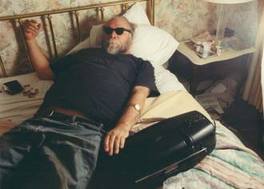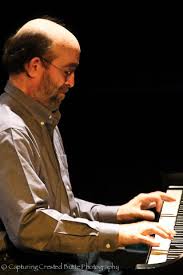Looking at YouTube videos of John Fahey in concert recently, I recalled vividly the technique I once so admired. Plant your right hand little finger on the pick-guard; pick away with the thumb and two fingers, get that alternating bass thumping beneath your treble melodies. His left hand had little agility, and he seldom used his left little finger. His natural home was first position, with rather cautious forays up the fingerboard. Rudimentary.
Still, he managed that mesmerizing drone and pulse-entraining rhythm. That je ne sais quoi heard so compellingly over headphones late at night.
As a classically-trained guitarist, I used all my fingers and the whole fingerboard right up onto the body of the guitar. I wrote elaborate musical narratives with mixed meter and fugue forms and motifs with variations and so on: Celtic rope-work of music.
I thought I was a hotshot. In retrospect, I wish I’d hewed closer to some of Fahey’s style, played less from the mind and more from the gut.
I met Fahey at Rev. Seaton’s place once more and, now in my late 20s, I found him puzzling more than profound. He was unassuming, courteous, rather shy; he mumbled, and spoke simply and frankly, but didn’t offer any detail or nuance in his comments. His face seemed to have thickened, rounded out, as had his body. I tried to talk guitar with him, but as before I don’t think I registered on his radar.
After that I didn’t see or hear from him for several years. Still, he ended up serving a pivotal role in my guitar career, and I ended up performing with him.
The reconnect happened this way: After my second album, Fireheart-Fireriver, had been in circulation for a couple of years, I began getting “fan mail” from some weirdo in Southern California. He claimed Fahey had turned him on to my album and that he just loved it.
The weirdo turned out to be George Winston, then virtually unknown but soon to become a super-star pianist on the Windham Hill label. He had recorded an album of blues piano on Takoma Records and had befriended Fahey. If memory serves, it was while visiting Fahey that he watched a cat playing with such exuberance that he eventually named his own record label Dancing Cat.
(George Winston has added a wonderful, cat-lover’s comment clarifying the origins of the name of his label — see Comments sidebar. His cat experience with Fahey was to ride bikes around Fahey’s neighborhood and looking at them.)
When George started recording his Autumn album on Windham Hill Records, he mentioned me to Will Ackerman; at around the same time, I saw Will and Alex de Grassi in concert in Santa Cruz and gave them each a copy of Fireheart-Fireriver. Will offered me a Windham Hill contract almost immediately.
George, for his part, remained a loyal fan, always listing me as one of his influences on his album covers and bringing my albums around to sell at his hugely-popular concerts. He certainly did more to promote my Willow album than I ever did.
In 1980, I finally performed a concert with Fahey, at the Great American Music Hall in San Francisco (George played a guest set). It was here I saw another side of Fahey — a lost man, living on the very edge — and the memory disturbs me to this day.
Fahey and I were in the “green room,” girding our loins for the concert. As the junior performer, I was to be the opening act and was intent on changing strings, tuning my guitars, and warming up, determined to wow the crowd. Fahey was intent on getting blitzed. He had a six-pack of beer with him and chugged one can after the other. When he was done he ordered a double brandy to be brought down from the bar.
At intervals, as he talked to himself, he watched me warm up and flattered me: “You’re really good, you know? I mean really fucking good. I mean it. Really good, man.”
By the time I went up to play, he was lurching, staggering. The bathroom struck him as being too far away, so he pissed into the wastebasket in the green room, partly out of necessity and partly in protest.
I played my set, sat in the audience to hear George play an intermezzo, then checked on Fahey in the green room. I did what I could to help him locate the stage, then returned to the audience to see how the hell he’d pull this off.
Fahey sat in his chair, tried to tune his guitar, seemed to lose his way in the process. Up, down, a siren, a sitar, this string, that string, at random: he seemed to have lost all perception of pitch. To fill the time, he spoke in an incoherent, thick-lipped ramble.
At intervals he’d start playing, but he was often in the wrong tuning and anyway he’d lose track of what he was doing within a few seconds and have to stop and back-fill with patter that was even worse than the playing. He’d call out to the bar to bring him another double brandy, as if one more would somehow empower him to play, and he must have drunk four or five of them while he was up there. He got up to go to the bathroom — or visit the wastebasket — a couple of times, and was gone for fifteen minutes each time. George kindly filled the gaps with piano music.
The audience — die-hard Fahey fans, including my brother, his wife, and my (adult) nieces — relished it all, thinking that this was a stage persona or self-parody, or was intended ironically. Or that it somehow constituted profound existential commentary.
I was simply mortified on his behalf. His set seemed to take forever; I literally sweated with embarrassment and anxiety through the whole thing. The empty stage, when he went to relieve himself, was excruciating for me.
And yet we’d seen only a fraction of Fahey’s excess. The after-concert party at my brother’s place upset even Fahey’s most devoted admirers..




This received from George Winston in response to John Fahey II: A Man on the Edge, with some factual corrections:
Dear Daniel—–great to hear from you !!—–and great writing——and here’s the cat story—
I named the label after a cat that lived with me, Mifffffff, that stood up to get his head scratched. He learned it from another cat who lived with us before disappearing, Arabella, who was the original dancing cat, and Mifffffff carried it on. Being big cat lovers, sometimes when I visited John, when we both lived in Los Angeles, he would tell me to take his wife’s bike and we would look for cats around his neighborhood.
Good piece, Daniel !
I sometimes think that my tendency toward long stories on stage was born of needing to do SOMETHING / ANYTHING to keep the audience in their seats at The Great American Music Hall when John would announce that he needed to go “take a piss….” That would usually entail an absence of at least a half hour or, perhaps more often, his absolute disappearance.
All that said, we all owe John dearly for his music and, not insignificantly to me, for the idea that a guitarist could start his own record label (Takoma / Windham Hill).
Will
Good to hear from you, Will!
I’m glad to hear another guitarist’s/performer’s perspective on working around the Great Beast Fahey. Yeah — Takoma Records. I always wondered, but never asked John, whether the name “Takoma” was not just the city’s name (Takoma Park, Maryland) but sort of a pun, like Uneeda Biscuit Company. Now that you mention it, I DO need a biscuit and yes, I think I’ll take home a record! With John, who knows?
Thanks for checking in.